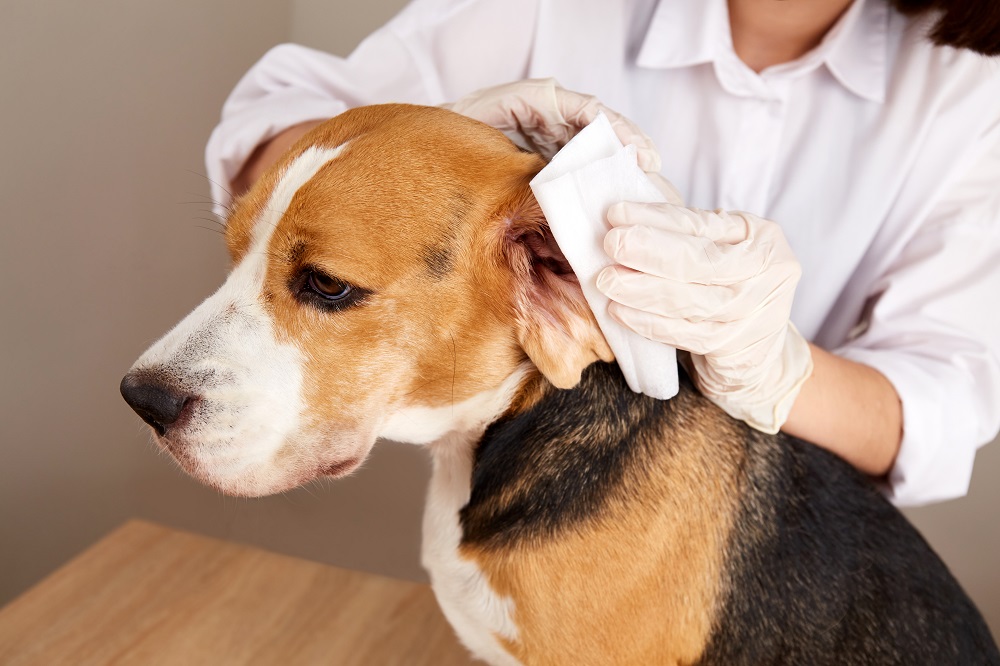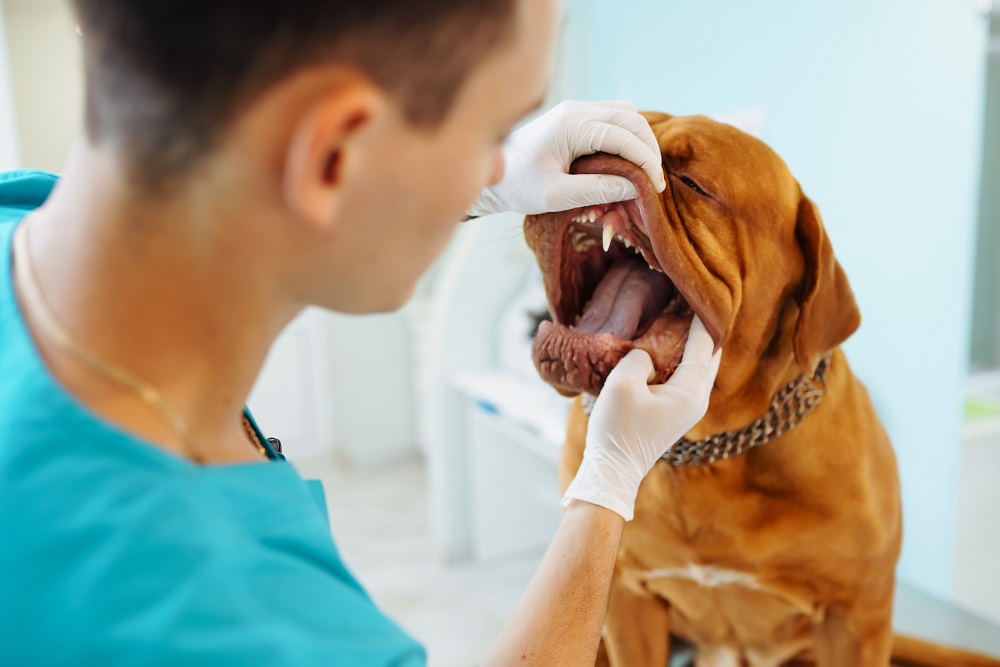These are the most frequent dog health problems, but having current vaccinations and regular vet check-ups will go a long way!
When you’re a dog owner, you do everything that is in your power to keep your furry friend wagging its tail and as healthy as possible. This can be achieved with regular visits to your vet; be sure you get all the mandatory vaccines your dog needs and, most importantly, feed it the right type of food.
But sometimes, the inevitable may happen even if you were extra careful and followed all the steps from above. And when it does, the easiest (and smartest) way to deal with your dog’s health problems is to know a little something about them and do what you can locally before going to the vet.
That’s why in this article, with the help of the best vets in town, we will approach some of the most frequent dog health problems and discuss each one to help you stay informed and ready in case it happens to your pooch too. So, let’s start!

Ear infections
Dogs with ear infections usually shake their heads and scratch their ears, which are frequently brought on by an overabundance of bacteria or yeast. Seeing your dog trying to scratch its ear is one of the most common symptoms, but it’s also possible to notice redness or swelling in the ear canal, fluid or purulent discharge of any color, and the ears may also smell bad.
Ear infections are very common in dogs, and because of that, many people neglect them. However, it has the potential to do significant harm if it’s left untreated.
See your veterinarian if your dog has been showing symptoms of an ear infection for longer than a day or two. Skin problems can occasionally coexist with ear infections. They might also have something to do with allergies.
Tip: If it’s the weekend and you might not have a veterinarian nearby, it’s recommended that you use a dog ear cleaner to help remove wax buildup. Make sure not to go deeper than the base of the ear canal when applying a tiny amount to the ear. Any discharge surrounding the ear canal entrance can be removed with a moist cotton ball (but never cotton swabs since they will only push the debris down the canal)!
Urinary tract infections
Another common health issue in dogs is urinary tract infections, and depending on the breed, it can happen often. Lethargy, increased thirst, frequent urination, inappropriate urination, and bloody urine are symptoms that your pooch is dealing with a urinary tract infection.
Type 2 diabetes and kidney disease are two more illnesses that may be linked to these symptoms, but you can’t figure them out on your own, so it’s advisable to take your dog to the vet so they can examine their urine if you observe any unusual urination patterns.
If some other dog health problems from the list can be ameliorated at home by the owner, this one needs immediate assistance from the vet.
Skin issues
A lot of dogs suffer from a range of skin conditions., but itching and scratching are common symptoms of skin problems. The skin may have an unusual appearance, such as being red, scaly, flaky, or inflamed. Patches of hair loss may also occur. Several things, such as allergies, parasites, and skin infections, can cause skin issues in dogs.
Same as other dog health problems, you as a dog owner may do certain things to ameliorate the symptoms or better to try and prevent them.
There are a lot of prescription shampoos for dogs whose skin is dry and itchy. For optimal effects, look for products that are fragrance-free and based on oatmeal. Your dog may need medical attention if their skin itches more than usual, and your veterinarian might suggest an antiseptic shampoo or mousse that contains chlorhexidine, which you can find at any vet pharmacy.
If you’re interested in buying a shampoo that’s vet-approved, check out the one from Vetnique, Dermabliss Anti Itch and Allergy Relief, that acts like a good moisturizer for the dog’s skin, leaving it fresh and stopping the itching after the 1st use. It’s available on Amazon for $19.99 for 16 oz.
Rabies
The virus that causes rabies spreads through an infected mammal’s saliva, usually through bites or scratches. There is no cure for it in dogs, and it causes neurological dysfunction that results in death. Despite the rarity of rabies cases, there is a very real risk to both humans and pets.
Thankfully, dogs can be protected against rabies by receiving a vaccination every one to three years, depending on the vaccine. To safeguard the public, the majority of states mandate rabies vaccinations.
Parvo
Among all the dog health problems, there is Parvo, which doesn’t sound very familiar to many people. What is Parvo exactly? Parvo, scientifically known as Canine parvovirus, is an extremely contagious illness that primarily affects puppies, but adult dogs who have not received the vaccination are also at risk, particularly those with weak immune systems.
The virus causes severe diarrhea, vomiting, and lethargy by attacking the rapidly dividing cells in the intestines and bone marrow. Parvo is typically fatal if treatment is not received, and even with vigorous treatment, some pups do not survive.
To keep your dog safe, prevention is essential. As told by your veterinarian, give your puppy all of its vaccinations, and until they are completely vaccinated, keep them away from other dogs and public areas. To stay safe, adult dogs must receive vaccinations every one to three years.

Dental disease
Same as humans, one of the most common dog health problems is teeth issues. If we take care of our oral hygiene as well as possible, we will not develop cavities or periodontitis. Imagine how it is for dogs that aren’t able to brush their teeth on their own.
If you notice that your pooch has bad breath, don’t overlook it, thinking, “It’s probably nothing!” because it can be a sign of dental disease, plaque, tartar, or any other underlying bacteria.
These may harm the gums and teeth, and oral bacteria can reach the bloodstream and harm the kidneys and heart. Regular tooth brushing and, of course, monthly veterinary checkups are the keys to preventing this health problem.
Obesity
I mean…everybody likes fluffy dogs, and a little bit of extra fluffiness is adorable. The question is how much is too much that can lead to one of the most common dog health problems, obesity.
But as weird as it sounds, obesity in dogs is also among the easiest health issues to avoid. Life-threatening illnesses like diabetes, heart disease, and joint problems may result from carrying too much weight, especially if the breed is also short. Fortunately, a healthy diet and regular exercise can prevent (and frequently reverse) obesity.
Consult with your vet about the best kibble or wet food for your dog, and make sure to cut back on the daily servings.
Dog flu
Dogs can get the flu, too, especially if they come in contact with other dogs. Although the virus that infects dogs does not infect humans, canine influenza can cause symptoms that are similar to those of the human flu.
While there is no specific treatment for this particular health problem, it’s recommended to keep your pooch warm and hydrated as much as possible, and if it gets a fever, ask the vet for some nonsteroidal anti-inflammatory meds.
Vaccination against canine influenza is strongly advised if you live in an apartment and must walk your dog every day and frequently interact with other dogs at places like dog parks, boarding facilities, dog shows, and daycare centers.
(Food) Poisoning
Last but not least, the dog health problem that you, as a dog owner, should be aware of is poisoning. If you already have a dog, then you probably know that they’re curious by nature, and if you’re not careful with what you leave outside the fridge, wardrobe, or kitchen drawers, the dog might grab it, and you will never see that item(s) again.
Toxins can take many different forms and are typically, though not always, eaten. Besides food like chocolate, avocado, and raisins, your dog can be poisoned by plants, medicines left unsupervised, and household objects.
If you suspect that your dog might have ingested a certain item or food you’re not sure about, call your vet right away!
You may also like: 10 Lap Dogs That Are Perfect for Snuggling.













2 Responses